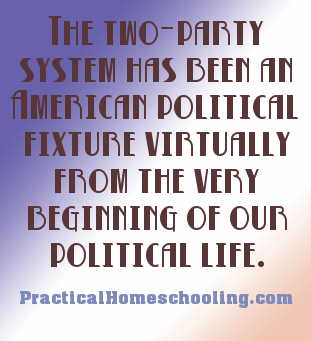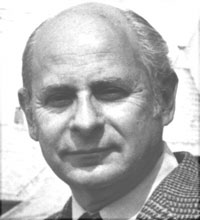Party Politics in the United States
By Sam Blumenfeld
Printed in Practical Homeschooling #83, 2008.
 Although George Washington tried to discourage the creation of “party spirit” (meaning political factions), it was inevitable that politicians would line up against one another along ideological lines.
Although George Washington tried to discourage the creation of “party spirit” (meaning political factions), it was inevitable that politicians would line up against one another along ideological lines.

| 
|
 If you want to become politically active or run for office, you will
have to join a political party. True, you can run as an Independent, but
you will not get many votes unless you have high recognition nationally
and in your community. Also, some states place great obstacles to
independent candidacies. State legislatures are run by political
parties, and they don’t like competition from independents.
If you want to become politically active or run for office, you will
have to join a political party. True, you can run as an Independent, but
you will not get many votes unless you have high recognition nationally
and in your community. Also, some states place great obstacles to
independent candidacies. State legislatures are run by political
parties, and they don’t like competition from independents.
The two-party system has been an American political fixture virtually
from the very beginning of our political life. Although George
Washington tried to discourage the creation of “party spirit” (meaning
political factions), it was inevitable that politicians would line up
against one another along ideological lines.
Our two dominant parties generally represent the opposing tendencies of
our fundamental political philosophy: between those who believe that the
government that governs best adheres to the principles of a
Constitutional republic by governing least, and those who believe that
government should actively do more to advance the welfare of the people,
such as in a European-style Social Democracy. In short, the battle is
basically between those who want less government in our lives, and those
who like government power and want a lot more of it.
The Founding Fathers were so concerned with preserving individual
freedom in America that they crafted a form of government with checks
and balances to prevent any despot from becoming a dictator. Added to
the Constitution was a Bill of Rights to make sure that politicians
could not legislate beyond the limits set by our fundamental law.
The result is that we have a Constitution that George Bernard Shaw
characterized as a “Charter of Anarchism.” He said in a lecture in 1933
that we had “a political party machinery of legislatures and senates,
which was so wonderfully devised that when you sent in one body of men
to govern the country, you sent in another body of men along with them
to prevent their doing it.”
Today, we call that situation “gridlock.” Gridlock currently is the main
recourse the American people have to prevent laws being passed that go
beyond what is acceptable to any large segment of our population.
Today, party politics has been intensified by the extensive use of the
electronic media. Radio, television, and the Internet have transformed
politics into an ongoing debate between candidates and party policies.
The media must fill their time with entertainment of all kinds, and
politics has become a kind of intellectual entertainment. The Sunday
morning talk-shows are supposed to educate the viewers, but they’ve
actually become showcases for political personalities and panelists.
Journalists appearing on television are now celebrities with views we
all take seriously. Because politics has been transformed into a kind of
entertainment, even Hollywood stars have been putting their two cents
into the political fray, though their input has been generally pretty
superficial.
In any case, an organized political party is the best way to get
involved in politics. Every community has its Democratic or Republican
town committee. An aspiring homeschooled politician will want to get to
know these individuals. You must start locally before you can become
known to the state party officials. If they like you, they will back
your candidacy.
If you don’t like what the two major parties stand for, there are always
the smaller third parties. Some of these third parties can have a strong
influence on the major parties. For example, the Socialist Party, which
offered the never successful candidate Norman Thomas for many decades,
eventually influenced the ideology of the Democratic Party. Today, the
Democrat Party espouses many programs originally suggested by the
Socialist Party.
Likewise, the Libertarian Party and the U.S. Taxpayer’s Party have had a
strong influence on the Republican Party by emphasizing individual
rights, low taxes, and smaller government.
Then, there are the spoiler parties, such as Theodore Roosevelt’s Bull
Moose Party and Ross Perot’s Reform Party. In both cases, by dividing
the Republican vote they permitted the Democrats to gain the Presidency.
Thus, the Bull Moose Party, which in 1912 split the Republican party and
prevented Howard Taft from winning a second term, gave us liberal
Woodrow Wilson, the Income Tax, and the Federal Reserve System. Ross
Perot’s candidacy prevented Republican George H.W. Bush from winning a
second term and gave us liberal Democrat Bill Clinton.
The reason why these smaller parties do not succeed in replacing any of
the major parties is that they cannot raise the kind of funds that the
major parties can. Big donors to political parties give money because
they want access to political power in Washington.
So if you want to get involved in politics, you’ll have to make some
important choices, and the earlier you start, the better.
Education expert Same Blumenfeld’s Alpha-Phonics reading program is
available Here. His latest book, The
Marlowe-Shakespeare Connection, is about the Shakespeare authorship
mystery.